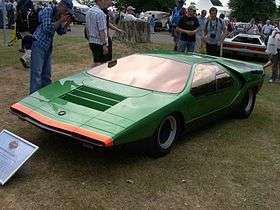Alfa Romeo Carabo
| Alfa Romeo Carabo | |
|---|---|
 | |
| Overview | |
| Production | 1968 |
| Designer | Marcello Gandini for Bertone |
| Body and chassis | |
| Class | Concept car |
| Body style | coupe |
| Platform | RMR layout |
| Related |
Alfa Romeo 33 Stradale Alfa Romeo 33.2 Alfa Romeo Iguana Alfa Romeo Navajo |
| Powertrain | |
| Engine | 1995 cc V8 |
| Transmission | Colotti 6-speed manual[1] |
| Dimensions | |
| Wheelbase | 2,350 mm (92.5 in) |
| Length | 4,176 mm (164.4 in) |
| Width | 1,785 mm (70.3 in) |
| Height | 990 mm (39.0 in) |
| Curb weight | 1,000 kg (2,205 lb) |
The Alfa Romeo Carabo is a concept car first shown at the 1968 Paris Motor Show.[1] It was designed by Marcello Gandini, working for the Bertone design studio.[2] Carabo name is derived of Carabidae, as evoked by the car's iridescent green and orange coloring.
The wedge design came into fashion in the late 1960s. The Carabo is often considered the winner of the 'Wedge War' award of 1968 and as the direct predecessor of the Countach and having heavily influenced many car designs to follow well into the next decade. It was never intended for production but fully functional and showcased features never expressed in any other car design in its day.
The prototype was built on the chassis of the Alfa Romeo 33 Stradale, a mid-engined V8. The Carabo engine made 230 bhp (172 kW; 233 PS) at 8800 rpm, which made it possible to achieve a top speed of 250 km/h (155 mph).[1]
The scissor doors later appeared on the Lamborghini Countach, which was also designed by Marcello Gandini.
A replica, built on a De Tomaso Pantera platform, was built by Sam Foose (father of Chip Foose) after he was unable to buy the concept from Bertone.[3] The Fiberfab Aztec was a kit car model based on the Carabo.[4]
Notes
- 1 2 3 "Alfa Romeo Carabo Concept". ultimatecarpage.com. Retrieved 2009-07-05.
- ↑ "The Stars & Cars of Bertone". Road & Track: 78. November 2014.
- ↑ "Foose Made Alfa Romeo Carabo Replica". carscoop.blogspot.com.
- ↑ "Rare Kit Car Sighting: Fiberfab Aztec 7". thesmokingtire.com.
External links
- Alfa Romeo Carabo Concept, UltimateCarPage.com.
- Alfa Romeo Carabo Photos, OldConceptCars.com.
- 1968 Alfa Romeo Carabo, ConceptCarz.com.
- Official Alfa Romeo Carabo Art, Alfaromeoart.com